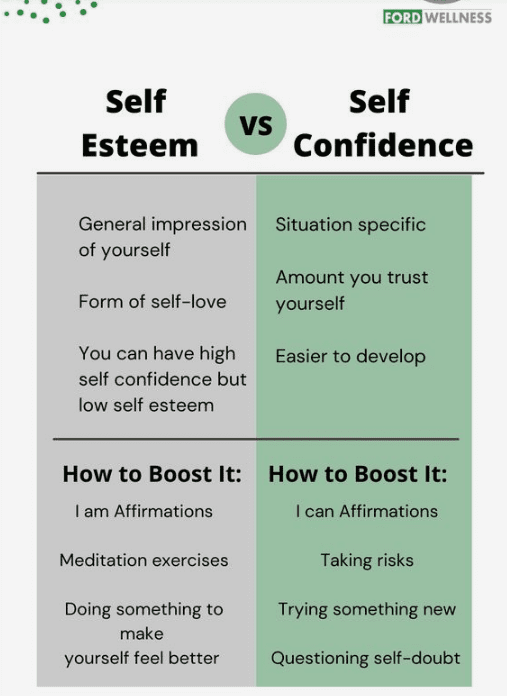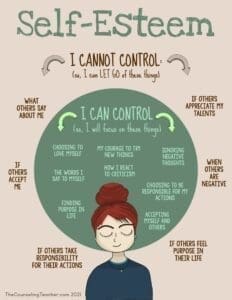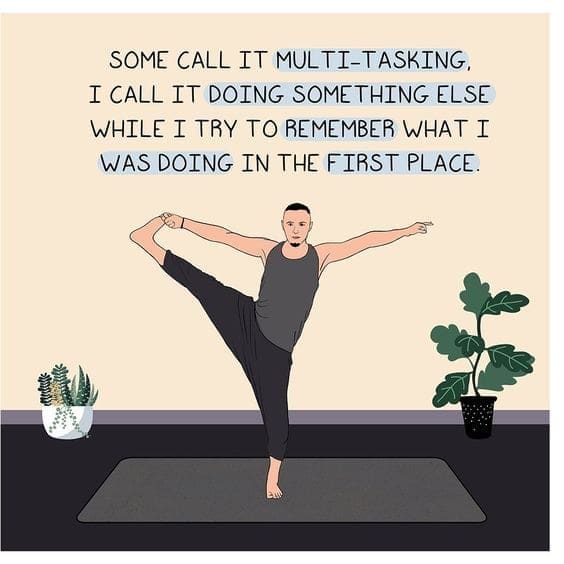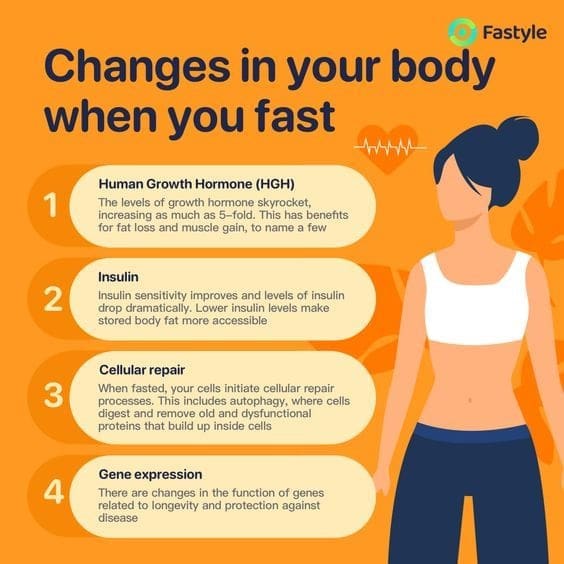The Importance of Self-Care in Building Confidence
Self-care has become a buzzword in recent years, and for good reason. In today’s fast-paced world, it’s easy to prioritize work and other responsibilities over taking care of ourselves. However, neglecting self-care can have a significant impact on our confidence levels. When we fail to prioritize our physical, emotional, and mental well-being, we may begin to feel overwhelmed, stressed, and burnt out. This can lead to self-doubt, anxiety, and a lack of confidence in our abilities. On the other hand, taking the time to care for ourselves can have a transformative effect on our confidence. By engaging in activities that nourish our minds, bodies, and souls, we can boost our self-esteem and develop a deeper sense of self-worth. In this article, we’ll explore the importance of self-care in building confidence, and provide some practical tips for incorporating self-care into your daily routine. So, sit back, relax, and let’s dive into the world of self-care and confidence-building.
What is self-care?
Self-care is the practice of taking deliberate actions to enhance our physical, emotional, and mental well-being. It involves engaging in activities that promote self-love, self-compassion, and self-awareness. Self-care can take many forms, including exercise, meditation, journaling, reading, spending time with loved ones, and engaging in hobbies. The key to self-care is to identify activities that nourish and energize us, and to make them a priority in our daily lives. Self-care is not a luxury; it is a fundamental aspect of maintaining our health and well-being.
Self-care can be broken down into three main categories: physical, emotional, and mental. Physical self-care involves taking care of our bodies through exercise, nutrition, and rest. Emotional self-care involves managing our emotions and nurturing our relationships. Mental self-care involves engaging in activities that promote mental clarity and well-being, such as meditation and journaling. All three categories are interconnected and equally important for our overall well-being.
Why is self-care important for building confidence?
Self-care is essential for building confidence because it helps us develop a positive relationship with ourselves. When we prioritize our self-care, we send a message to ourselves that we are valuable and deserving of love and attention. This, in turn, helps us develop a deeper sense of self-worth and self-esteem. When we feel good about ourselves, we are more likely to take risks, set goals, and pursue our dreams. On the other hand, when we neglect our self-care, we send a message to ourselves that we are not important. This can lead to feelings of self-doubt and a lack of confidence in our abilities.
The benefits of self-care for mental health
Self-care has numerous benefits for our mental health. By engaging in activities that promote self-love and self-compassion, we can reduce feelings of stress, anxiety, and depression. Self-care can also help us develop a greater sense of self-awareness, which can lead to a deeper understanding of our own thoughts, feelings, and behaviors. This can lead to greater emotional stability and resilience in the face of life’s challenges. Additionally, self-care can help us develop a more positive outlook on life, which can lead to a greater sense of well-being and happiness.
The connection between self-care and self-esteem.
Self-care and self-esteem are closely interconnected. When we prioritize our self-care, we send a message to ourselves that we are valuable and deserving of love and attention. This, in turn, helps us develop a deeper sense of self-worth and self-esteem. When we feel good about ourselves, we are more likely to take risks, set goals, and pursue our dreams. On the other hand, when we neglect our self-care, we send a message to ourselves that we are not important. This can lead to feelings of self-doubt and a lack of confidence in our abilities.

Self-care practices to boost confidence
There are many self-care practices that can help boost our confidence. Here are a few ideas:
– Exercise: Regular exercise can help boost our mood and energy levels, and improve our physical health. This, in turn, can lead to greater confidence in our abilities.
– Meditation: Meditation can help reduce feelings of stress and anxiety, and promote greater self-awareness and emotional stability. This can lead to greater confidence in our ability to manage our thoughts and emotions.
– Journaling: Journaling can help us process our thoughts and feelings, and develop a greater sense of self-awareness. This can lead to greater confidence in our ability to understand our own thoughts and emotions.
– Spending time with loved ones: Spending time with loved ones can help us feel more connected and supported, which can boost our confidence in our ability to navigate life’s challenges.
– Engaging in hobbies: Engaging in hobbies can help us develop a sense of mastery and accomplishment, which can boost our confidence in our abilities.
Mindfulness and self-care
Mindfulness is the practice of being present and fully engaged in the current moment. Mindfulness can be a powerful tool for self-care because it can help us develop a greater sense of self-awareness and emotional stability. By being present in the moment, we can better understand our own thoughts and emotions, and develop greater insight into our own patterns of behavior. This, in turn, can help us make more informed choices about how to care for ourselves and boost our confidence in our ability to manage our own well-being.
How to make self-care a daily habit
Making self-care a daily habit can be challenging, but it is essential for our overall well-being. Here are a few tips for incorporating self-care into your daily routine:
– Prioritize self-care: Make self-care a priority in your daily schedule, and treat it as an essential aspect of your overall health and well-being.
– Start small: Begin by incorporating small self-care practices into your daily routine, such as taking a few minutes to meditate or journal.
– Be consistent: Consistency is key when it comes to self-care. Try to engage in self-care activities at the same time each day, or on a regular schedule.
– Be flexible: Life can be unpredictable, and it’s important to be flexible with your self-care routine. If you miss a day or need to adjust your routine, don’t beat yourself up about it. Simply adjust and keep moving forward.
– Get support: Surround yourself with people who support your self-care goals, and seek out resources and tools to help you stay on track.
Common myths about self-care
There are many myths about self-care that can make it challenging to prioritize. Here are a few common myths and the truth behind them:
– Myth: Self-care is selfish.
– Truth: Self-care is not selfish; it is essential for our overall health and well-being. When we prioritize our self-care, we are better able to care for others and meet our responsibilities.
– Myth: Self-care is only for people with a lot of free time.
– Truth: Self-care can take many forms, and can be incorporated into even the busiest of schedules. It’s all about prioritizing the activities that nourish and energize us.
– Myth: Self-care is expensive.
– Truth: Self-care does not have to be expensive. There are many low-cost or free self-care practices, such as meditation, journaling, and spending time with loved ones.
Self-care resources and tools
There are many resources and tools available to help us incorporate self-care into our daily lives. Here are a few ideas:
– Self-care apps: There are many apps available that can help us track our self-care activities, set goals, and get reminders to prioritize our well-being.
– Self-help books: There are many self-help books available that can provide inspiration and guidance for incorporating self-care into our daily lives.
– Support groups: Joining a support group can provide a sense of community and accountability for our self-care goals.
– Professional help: If you are struggling with mental health issues, seeking professional help can be an important aspect of self-care.
Conclusion
Self-care is essential for building confidence and maintaining our overall health and well-being. By prioritizing our physical, emotional, and mental well-being, we can boost our self-esteem and develop a deeper sense of self-worth. Incorporating self-care into our daily routines can be challenging, but it is essential for our overall well-being. By starting small, being consistent, and seeking out support and resources, we can make self-care a daily habit and reap the many benefits it has to offer. So, go ahead and prioritize yourself – you deserve it!
Disclaimer
The content is purely informative and educational in nature and should not be construed as medical advice. Please use the content only in consultation with an appropriate certified medical or healthcare professional

The Importance of Self-Care in Building Confidence
Self-care has become a buzzword in recent years, and for good reason. In today’s fast-paced world, it’s easy to prioritize work and other responsibilities over taking care of ourselves. However, neglecting self-care can have a significant impact on our confidence levels. When we fail to prioritize our physical, emotional, and mental well-being, we may begin to feel overwhelmed, stressed, and burnt out. This can lead to self-doubt, anxiety, and a lack of confidence in our abilities. On the other hand, taking the time to care for ourselves can have a transformative effect on our confidence. By engaging in activities that nourish our minds, bodies, and souls, we can boost our self-esteem and develop a deeper sense of self-worth. In this article, we’ll explore the importance of self-care in building confidence, and provide some practical tips for incorporating self-care into your daily routine. So, sit back, relax, and let’s dive into the world of self-care and confidence-building. What is self-care? Self-care is the practice of taking deliberate actions to enhance our physical, emotional, and mental well-being. It involves engaging in activities that promote self-love, self-compassion, and self-awareness. Self-care can take many forms, including exercise, meditation, journaling, reading, spending time with loved ones, and engaging in hobbies. The key to self-care is to identify activities that nourish and energize us, and to make them a priority in our daily lives. Self-care is not a luxury; it is a fundamental aspect of maintaining our health and well-being. Self-care can be broken down into three main categories: physical, emotional, and mental. Physical self-care involves taking care of our bodies through exercise, nutrition, and rest. Emotional self-care involves managing our emotions and nurturing our relationships. Mental self-care involves engaging in activities that promote mental clarity and well-being, such as meditation and journaling. All three categories are interconnected and equally important for our overall well-being. Why is self-care important for building confidence? Self-care is essential for building confidence because it helps us develop a positive relationship with ourselves. When we prioritize our self-care, we send a message to ourselves that we are valuable and deserving of love and attention. This, in turn, helps us develop a deeper sense of self-worth and self-esteem. When we feel good about ourselves, we are more likely to take risks, set goals, and pursue our dreams. On the other hand, when we neglect our self-care, we send a message to ourselves that we are not important. This can lead to feelings of self-doubt and a lack of confidence in our abilities. The benefits of self-care for mental health Self-care has numerous benefits for our mental health. By engaging in activities that promote self-love and self-compassion, we can reduce feelings of stress, anxiety, and depression. Self-care can also help us develop a greater sense of self-awareness, which can lead to a deeper understanding of our own thoughts, feelings, and behaviors. This can lead to greater emotional stability and resilience in the face of life’s challenges. Additionally, self-care can help us develop a more positive outlook on life, which can lead to a greater sense of well-being and happiness. The connection between self-care and self-esteem. Self-care and self-esteem are closely interconnected. When we prioritize our self-care, we send a message to ourselves that we are valuable and deserving of love and attention. This, in turn, helps us develop a deeper sense of self-worth and self-esteem. When we feel good about ourselves, we are more likely to take risks, set goals, and pursue our dreams. On the other hand, when we neglect our self-care, we send a message to ourselves that we are not important. This can lead to feelings of self-doubt and a lack of confidence in our abilities. Self-care practices to boost confidence There are many self-care practices that can help boost our confidence. Here are a few ideas: – Exercise: Regular exercise can help boost our mood and energy levels, and improve our physical health. This, in turn, can lead to greater confidence in our abilities. – Meditation: Meditation can help reduce feelings of stress and anxiety, and promote greater self-awareness and emotional stability. This can lead to greater confidence in our ability to manage our thoughts and emotions. – Journaling: Journaling can help us process our thoughts and feelings, and develop a greater sense of self-awareness. This can lead to greater confidence in our ability to understand our own thoughts and emotions. – Spending time with loved ones: Spending time with loved ones can help us feel more connected and supported, which can boost our confidence in our ability to navigate life’s challenges. – Engaging in hobbies: Engaging in hobbies can help us develop a sense of mastery and accomplishment, which can boost our confidence in our abilities. Mindfulness and self-care Mindfulness is the practice of being present and fully engaged in the current moment. Mindfulness can be a powerful tool for self-care because it can help us develop a greater sense of self-awareness and emotional stability. By being present in the moment, we can better understand our own thoughts and emotions, and develop greater insight into our own patterns of behavior. This, in turn, can help us make more informed choices about how to care for ourselves and boost our confidence in our ability to manage our own well-being. How to make self-care a daily habit Making self-care a daily habit can be challenging, but it is essential for our overall well-being. Here are a few tips for incorporating self-care into your daily routine: – Prioritize self-care: Make self-care a priority in your daily schedule, and treat it as an essential aspect of your overall health and well-being. – Start small: Begin by incorporating small self-care practices into your daily routine, such as taking a few minutes to meditate or journal. – Be consistent: Consistency is key when it comes to self-care. Try to engage in self-care activities at the same time each day, or on a regular schedule. – Be flexible: Life can be unpredictable, and it’s

The Power of Self-Care: Unlocking Productivity and Happiness
Explore the essential journey of self-care with us, and unlock a world where well-being, creativity, and happiness thrive in the midst of our fast-paced lives. By prioritizing physical, mental, and emotional wellness, discover how self-care can transform your daily experience, fostering resilience and a balanced equilibrium between productivity and personal fulfillment. Understanding the importance of self-care for productivity and happiness Self-care is often misunderstood as a luxury, something reserved for those with ample free time and resources. However, the truth is that self-care is a necessity for everyone, regardless of their circumstances. It is the foundation upon which we build our productivity and happiness. Without proper self-care, our physical and mental health can suffer. Neglecting ourselves can lead to burnout, decreased motivation, and a decline in overall well-being. On the other hand, when we prioritize self-care, we give ourselves the tools we need to thrive. Self-care allows us to recharge our batteries, giving us the energy and focus necessary to tackle our daily tasks with efficiency and enthusiasm. It helps us maintain a positive mindset, enabling us to overcome challenges and setbacks with resilience. By taking care of ourselves, we become better equipped to handle the demands of life, both personally and professionally. The connection between self-care and mental health One of the most significant benefits of practicing self-care is its positive impact on our mental health. In our fast-paced society, stress and anxiety have become all too common. Self-care provides us with the tools to combat these mental health challenges. Engaging in self-care activities, such as exercise, meditation, and spending time in nature, helps to reduce stress levels and promote relaxation. These practices activate the body’s relaxation response, counteracting the effects of chronic stress. Additionally, self-care allows us to prioritize our emotional well-being. It provides us with the opportunity to acknowledge and address our emotions, fostering a greater sense of self-awareness and emotional resilience. By taking care of our mental health, we can enhance our overall happiness and well-being. Benefits of incorporating self-care into your routine Incorporating self-care into our daily routines offers a multitude of benefits. From improved physical health to increased productivity and happiness, self-care is a powerful tool that can enhance every aspect of our lives. Physically, self-care practices such as regular exercise, healthy eating, and adequate sleep promote overall well-being. These activities boost our energy levels, strengthen our immune system, and improve our physical endurance. By investing in our physical health, we can experience increased productivity, as well as a greater sense of vitality and happiness. Mentally, self-care activities such as meditation, journaling, and engaging in hobbies provide us with much-needed mental space. These practices allow us to relax, recharge, and rejuvenate our minds. By incorporating self-care into our routines, we can enhance our focus, creativity, and problem-solving abilities, ultimately improving our productivity and overall happiness. Self-care ideas for enhancing productivity When it comes to self-care, there is no one-size-fits-all approach. Each individual has unique needs and preferences. However, there are several self-care ideas that are known to enhance productivity and can be tailored to suit your lifestyle. One effective self-care practice for enhancing productivity is creating a morning routine. Starting your day with activities that nourish your mind, body, and spirit sets a positive tone for the rest of the day. This may include activities such as meditation, exercise, reading, or practicing gratitude. Another self-care idea is setting boundaries and learning to say no. In our fast-paced society, it’s easy to become overwhelmed with commitments and obligations. By setting clear boundaries and prioritizing your own needs, you can create space for self-care and protect your productivity. Additionally, taking regular breaks throughout the day is crucial for maintaining productivity. Engaging in short bursts of physical activity, practicing deep breathing exercises, or simply stepping away from your desk for a few minutes can significantly improve your focus and productivity. Self-care practices for boosting happiness Self-care is not just about productivity; it’s also about finding joy and fulfillment in our lives. Incorporating self-care practices that boost our happiness can have a profound impact on our overall well-being. One self-care practice for boosting happiness is practicing gratitude. Taking the time to reflect on the things we are grateful for can shift our focus from what is lacking to what is abundant in our lives. This simple practice cultivates a positive mindset and enhances our overall happiness. Engaging in activities that bring us joy and fulfillment is another powerful self-care practice. This may include hobbies, spending time with loved ones, or pursuing creative outlets. By prioritizing activities that bring us happiness, we nourish our souls and enhance our overall well-being. Creating a self-care plan To incorporate self-care effectively into our lives, it’s essential to create a self-care plan. A self-care plan helps us prioritize our well-being and ensures that we are consistently engaging in activities that promote our productivity and happiness. Start by identifying the self-care activities that resonate with you the most. Reflect on the activities that bring you joy, relaxation, and a sense of fulfillment. These activities will form the foundation of your self-care plan. Next, consider your schedule and commitments. Allocate specific time slots for self-care activities, ensuring that they are given the same level of importance as other tasks. Treat these time slots as non-negotiable, just like any other important appointment or deadline. Finally, be flexible and open to adjusting your self-care plan as needed. Life is unpredictable, and circumstances may arise that require you to adapt your self-care routine. By remaining flexible and open-minded, you can ensure that self-care remains a priority, even during challenging times. Overcoming obstacles to practicing self-care While self-care is crucial for our productivity and happiness, it’s not always easy to prioritize. We often face various obstacles that can hinder our self-care efforts. However, with the right mindset and strategies, we can overcome these obstacles and make self-care a non-negotiable part of our lives. One common obstacle to practicing self-care is guilt. Many of us feel guilty for









